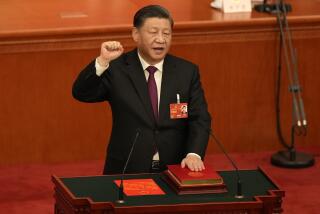China Detains Leaders of New Opposition Party
SHANGHAI — In a wide-reaching crackdown on one of China’s first opposition parties, police in three cities have detained 10 of its leaders, and the tearful wife of one of the activists accused the government Tuesday of “cheating its people and cheating the world.”
The roundup Monday came just days after Li Peng, the leader of China’s parliament, declared that any group opposing the Communist Party “will not be allowed to exist,” signaling the official closing of a brief window of political tolerance in China.
Intellectuals, artists and a handful of others have been allowed to explore political pluralism in the past year or so. But with the arrests of the members of the fledgling China Democracy Party, Beijing’s leadership appears to have drawn a line between discussion of political openness and actual organization to promote it.
On Monday night, police entered the Beijing home of the chairman of the party, Xu Wenli. They confiscated his computer, fax machine, videotapes and personal phone lists, his wife said, and took him away.
The same day, authorities arrested or detained at least nine other members of the party in Hangzhou, Wuhan and Beijing, charging some with conspiring to overthrow the government, a serious offense that could bring a life sentence.
In Washington, the State Department called Xu’s detention “a serious step in the wrong direction.”
“We conveyed our strong views to officials in the Chinese Ministry of Foreign Affairs today in Beijing and urged the authorities to release Xu immediately,” said State Department spokesman James P. Rubin.
Xu, a 55-year-old veteran dissident, announced the formation of the Beijing and Tianjin branches of the party in mid-November. The group hopes to build a multi-party system in China and to press the country’s leaders to abide by international human rights agreements.
Xu has already spent 12 years in prison, many of them in solitary confinement, for promoting such democratic ideals.
But activists such as Xu had been emboldened by what appeared to be a more tolerant mood lately among authorities. In October, China signed the International Covenant on Civil and Political Rights, which guarantees the freedoms of elections, assembly and speech.
Democracy campaigners were also encouraged by President Clinton’s visit to China in June, when he engaged Chinese President Jiang Zemin in a discussion on live television of human rights. During Clinton’s visit, Xu and his colleagues announced that they would organize a new political party.
“My husband tried to establish this party 20 years ago, and he was arrested then, in 1981,” Xu’s wife, He Xitong, said from their home in Beijing. “After 20 years, it seemed the country had started to change.”
Speaking through tears, she described the ebullience of the small group of leaders celebrating the beginning of a new party that could help speed that change.
“The feeling was like the establishment of the Communist Party long ago,” she said.
But since the formation of the Beijing branch last month, security officials have kept the couple under 24-hour surveillance, she said.
Xu has been briefly detained several times this year. This time, police served him with an official arrest and search warrant calling him a “criminal suspect,” which means he may be formally charged and brought to trial.
In testing China’s political boundaries, the new party has been careful to stay within the official rules. The party platform states that its members “respect the Communist Party’s ruling status.” They also pledged that they would not violate the constitution or the law.
But Xu’s wife, He, a retired schoolteacher, speculated that the group may have alarmed leaders with its rapid growth and recent criticism of the government. The party says it has attracted about 500 public members across the country, and even more underground, many keeping in touch by e-mail and the Internet.
During Jiang’s state visit to Japan last week, the party criticized the president for not demanding a full apology and reparations from Japan for World War II atrocities.
That may have been too direct for the government’s taste.
Li, who is No. 2 in the Communist Party, told the German newspaper Handelsblatt last week: “China promotes democracy and practices the rule of law, but our road is not patterned on the Western approach that features the separation of powers, a multi-party system and privatization.”
He Xitong, who had had no word of her husband’s whereabouts, said Tuesday: “If it is true that Li Peng said that China cannot have a multi-party system, then the government is cheating its people and cheating the world. China signed the U.N. covenant.”
More to Read
Sign up for Essential California
The most important California stories and recommendations in your inbox every morning.
You may occasionally receive promotional content from the Los Angeles Times.










